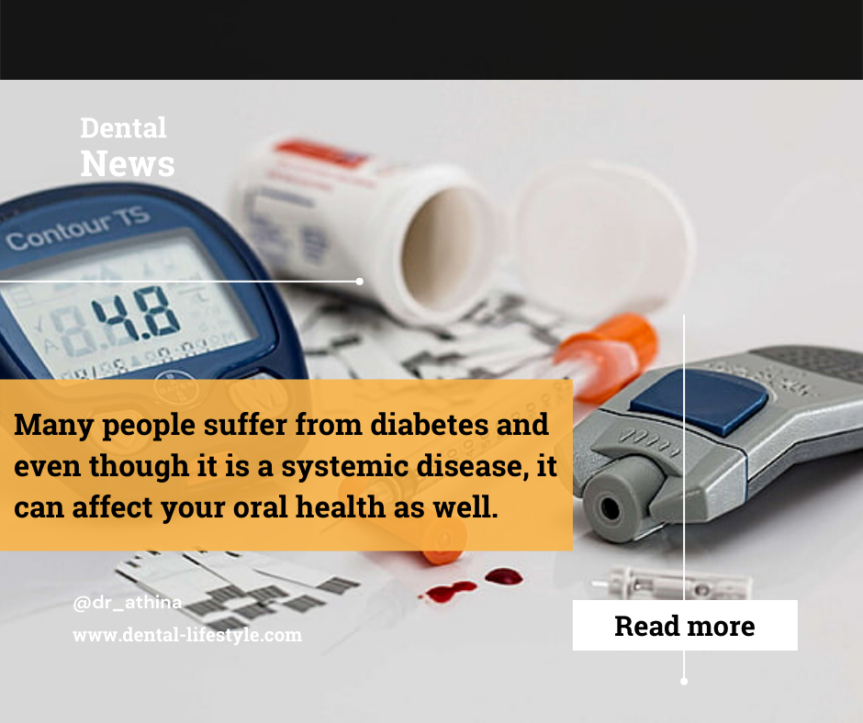Many people suffer from diabetes and even though it is a systemic disease, it can affect your oral health as well. Here, in this article, we explain briefly what it is and how it manifests in your oral cavity. You can also find tips you should keep in mind to improve your oral health status. Let’s take a look!
Diabetes mellitus is a group of metabolic diseases that lead to high levels of blood glucose (hyperglycemia), which is caused when the body does not make any or enough insulin or does not use insulin well.
There Are Two Types Of Diabetes:
Type 1 Diabetes:
Is a chronic autoimmune disease in which the beta cells in the pancreas create little to no insulin, and account for 5% to 10% of all diabetes cases.
Type 2 Diabetes:
Accounts for 85% to 90% or more of diabetes cases and is one of the commonest chronic diseases, characterized by the decreased response of target tissues to insulin, dysregulation of insulin production, or a combination of both.
Oral Manifestations:
Some of the general symptoms of diabetes include weight loss, impaired wound healing, blurred vision, high susceptibility to infections and if things get even worse diabetes can mess with your CNS system, cause chest pain, GIT symptoms, kidney failure, myocardial infarction or even death.
Except for the general symptoms, you notice if you suffer from diabetes, you can also beware of its oral manifestations:
- Burning mouth syndrome
- Impaired wound healing
- Increased incidence of infections
- Xerostomia, which can lead to minor mucosal ulceration
- Salivary gland enlargement
- Increased incidence of dental caries
- Periodontal disease, triggered by the increased glucose levels.
Poorly controlled diabetes can increase the risk of dentoalveolar infections. These patients respond less favorably to both surgical and non-surgical periodontal treatments.
Periodontal Disease
Periodontal disease is the most common dental disease affecting those living with diabetes, affecting nearly 22% of those diagnosed. Especially with increasing age, poor blood sugar control increases the risk for gum problems. In fact, people with diabetes are at a higher risk for gum problems because of poor blood sugar control. As with all infections, serious gum disease may cause blood sugar to rise. This makes diabetes harder to control because you are more susceptible to infections and are less able to fight the bacteria invading the gums.
How Can Your Dentist Help?
First of all, there are specific questions your dentist should ask you prior to any treatment, and these include:
- How old were you when you were diagnosed with diabetes and what type of diabetes do you have? How long has it been since the diagnosis?
- What medications do you take?
- How do you monitor your blood sugar levels?
- How often do you see your doctor about your diabetes?
- When was your last visit to the doctor?
- What was the most recent HbA1c (A1C) result?
- Do you ever have episodes of very low (hypoglycemia) or very high blood sugar (hyperglycemia)?
- Do you ever find yourself disoriented, agitated, and anxious for no apparent reason?
- Do you have any mouth sores or discomfort?
- Does your mouth feel dry?
- Do you have any other medical conditions related to your diabetes, such as heart disease, high blood pressure, history of stroke, eye problems, limb numbness, kidney problems, delays in wound healing, history of gum disease? Please describe.
Tips For Your Dental Appointments And Treatments:
In general, morning appointments are advisable in patients with diabetes since endogenous cortisol levels are typically higher at this time; because cortisol increases blood sugar levels, the risk of hypoglycemia is less.
For patients using short- and/or long-acting insulin therapy, appointments should be scheduled so they do not coincide with peak insulin activity, which increases the risk of hypoglycemia.
It is important to confirm that the patient has eaten normally prior to the appointment and has taken all scheduled medications.
In some situations, elective dental treatment may need to be delayed until the patient’s diabetes is considered stable or better controlled.
Dental implants can be placed in patients with well-controlled diabetes, and possibly in those with moderately controlled disease. However, implant placement in patients with the poorly controlled disease has an unpredictable prognosis and, if possible, should be avoided
Emergency Management
Although patients with diabetes usually recognize signs and symptoms of hypoglycemia and self-intervene before changes in or loss of consciousness occur, they may not. Staff should be trained to recognize the signs (e.g., unusual behavior or profuse sweating in patients who have diabetes) and treat patients who have hypoglycemia; a glucometer should be used to test patient blood glucose levels. Every dental office should have a protocol for managing hypoglycemia in conscious and unconscious patients. Having snack foods or oral glucose tablets or gels available.
Everyday Dental Care Tips
- Keep your blood sugar as close to normal as possible.
- If you have a dry mouth, try a mouthwash without alcohol.
- Brush your teeth after every meal. Wait at least 30 minutes after eating before brushing to protect any tooth enamel that’s been softened by acid in the food.
- Use a toothbrush with soft bristles.
- Floss at least once a day.
- Rinse daily with an antiseptic mouthwash.
- If you wear dentures, remove them and clean them daily. Do not sleep in them.
- If you smoke, talk to your doctor about ways to quit.
Athina Tsiorva


